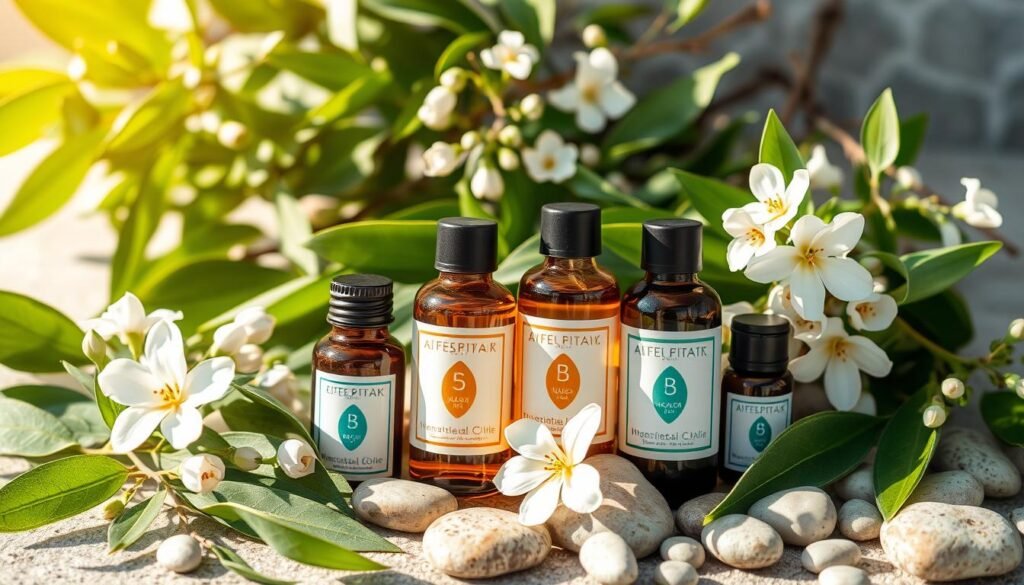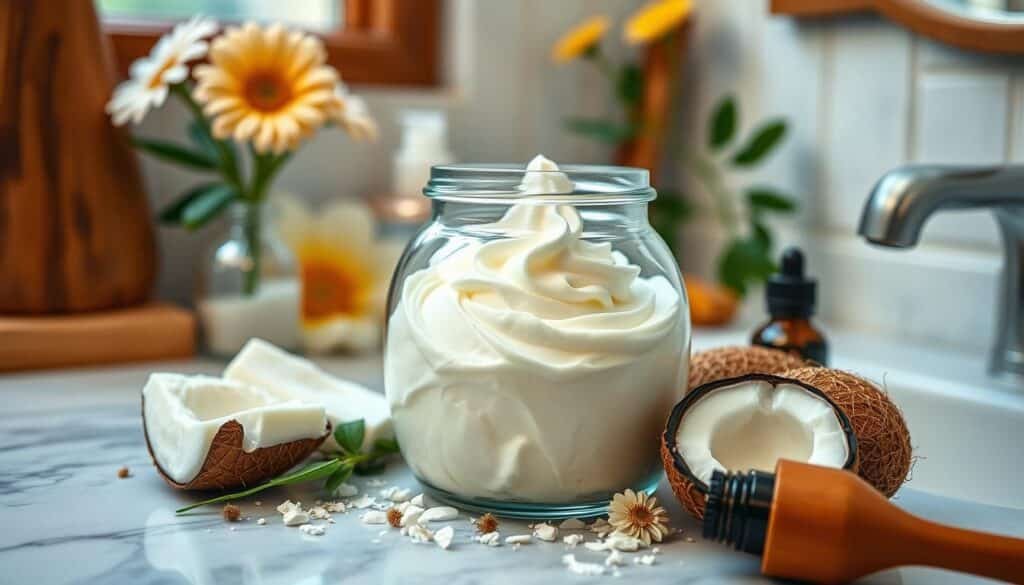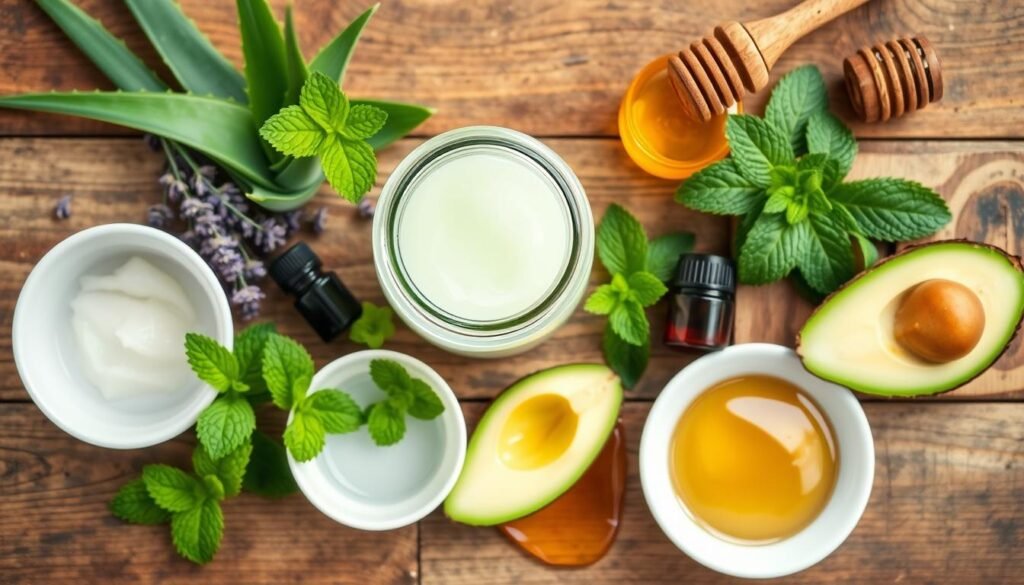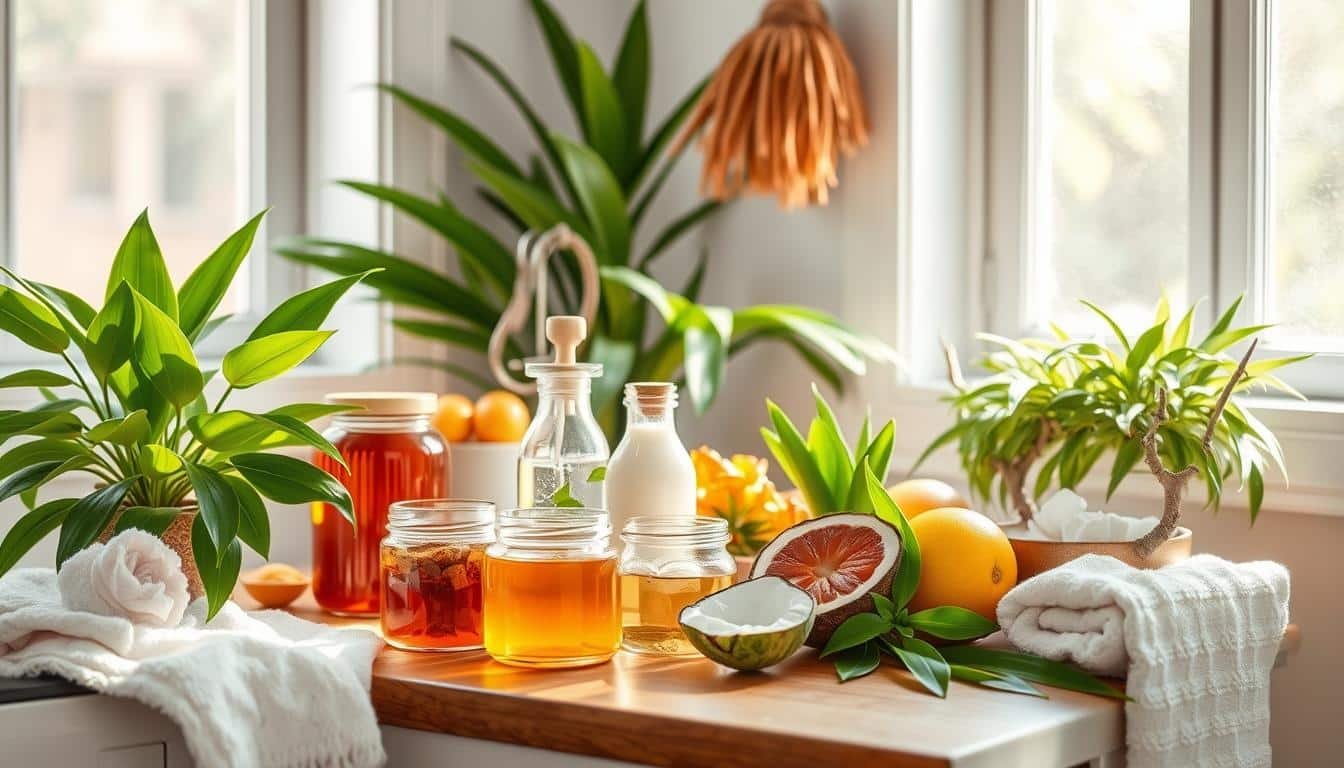Natural ingredients can change the game for healthy, glowing skin. DIY hydrating skincare offers a natural way to care for dry skin. It uses ingredients like olive oil, avocado, and coconut oil that are full of good stuff for your skin.
These ingredients help improve your skin’s texture and make it look better. They also reduce inflammation and make your skin look radiant and hydrated.
Oatmeal soaks and honey treatments are great for dry skin too. They help soothe and moisturize your skin. Using these natural ingredients, you can make a skincare routine that’s just right for you.
Whether you want to fight dryness, reduce fine lines, or get a youthful glow, DIY skincare is a great choice. It’s good for your skin and the planet.
Key Takeaways
- Natural ingredients like olive oil, coconut oil, and avocado can effectively hydrate and nourish dry skin.
- DIY skincare solutions offer a customizable, sustainable approach to achieving a healthy, radiant complexion.
- Beneficial components in natural ingredients, such as antioxidants and vitamins, can improve skin texture and reduce inflammation.
- Homemade remedies like oatmeal soaks and honey treatments provide soothing, replenishing benefits for parched skin.
- Crafting a personalized DIY hydrating skincare routine can help address a variety of complexion concerns, from dryness to fine lines.
Understanding Natural Skin Hydration and Moisture Balance
Healthy, glowing skin needs a balance of hydration and moisture. Hydration means keeping the right water levels in skin cells. Moisture balance is about having the right oils and lipids to keep skin soft and protected.
The Science Behind Skin Hydration
About 60% of an adult’s body is water, and hydration is crucial for skin health. Dehydrated skin looks thin and deflated. But, well-hydrated skin is plump and soft.
Ingredients like oats, honey, and aloe draw water into skin cells. This provides essential hydration. Emollients, on the other hand, help keep water in the skin, making it feel smooth.
Common Causes of Dry and Dehydrated Skin
Weather, harsh soaps, and aging can dry out your skin. Dry skin looks flaky, rough, and dull. It can even cause wrinkles and breakouts.
Benefits of Natural Ingredients for Skin
Natural ingredients are full of antioxidants, vitamins, and fatty acids that are good for the skin. They strengthen the skin’s barrier, reduce inflammation, and make the skin glow. Adding natural hydrators and moisturizers to your skincare routine can nourish and revitalize your skin.
| Ingredient | Benefits |
|---|---|
| Hyaluronic Acid | Significant hydrator that attracts and retains water in the skin, promoting plumpness and elasticity. |
| Glycerin | Exceptional moisture-binding properties, helping to maintain skin hydration and softness. |
| Aloe Vera | Soothing and hydrating properties, helping to calm and nourish the skin. |
| Honey | Humectant properties that draw moisture into the skin, providing hydration and nourishment. |
Knowing about skin hydration and natural ingredients helps you make your own skincare solutions. These solutions can meet your skin’s needs and give you a radiant glow.
Essential Natural Oils for Deep Skin Moisturizing

Natural oils are a powerful way to moisturize and nourish your skin. Oils like coconut, olive, jojoba, and argan deeply hydrate and protect your skin’s barrier.
Coconut oil has been used for centuries for skin and hair care. It’s known for being gentle. Olive oil and sunflower seed oil are also gentle and effective. But, essential oils like tea tree, argan, and lemon oil might cause more allergic reactions.
If you have oily or acne-prone skin, coconut oil and cocoa butter might not be the best choice. They could cause breakouts. But, research shows coconut oil is better than olive oil for moisturizing.
Sunflower seed oil is better for infants’ skin than olive oil. It’s also good for those with atopic dermatitis. Other oils like shea butter, jojoba, almond, grapeseed, and rose hip seed oil have many benefits. They can reduce inflammation and protect against damage.
Adding these natural oils to your skincare routine can deeply moisturize and nourish your skin. You can use them in baths, after showers, or in DIY recipes.
“Coconut oil, olive oil, and sunflower seed oil have shown centuries of experience with minimal allergic reactions when used for skin and hair care.”
Power-Packed Butter-Based DIY Solutions

Discover the secret to deeply hydrated skin with DIY solutions using shea and cocoa butters. These natural wonders provide unmatched moisturization, nourishing your skin from the inside out. Find out how these recipes can make your skin glow.
Shea Butter Combinations for Maximum Hydration
Shea butter is great for mixing with other natural oils and butters. Make a super-hydrating moisturizer by blending shea butter with aloe vera gel, coconut oil, glycerin, and vitamin E oil. Add beeswax, rose water, and a few drops of your favorite essential oils. This creates a rich, creamy moisturizer that deeply hydrates and keeps moisture locked in for hours.
Cocoa Butter Recipes for Skin Nourishment
Cocoa butter is famous for softening the skin and its rich scent. Use it in your DIY skincare for a luxurious treat. Mix cocoa butter with jojoba oil, shea butter, and a bit of vanilla essential oil. This makes a luxurious body butter that melts into your skin, leaving it smooth and hydrated.
Storage and Shelf Life Tips
Storing and knowing the shelf life of homemade skincare is key. Store your creations in airtight containers, away from sunlight and heat. This keeps them potent and fresh for months, ready to nourish your skin.
| Ingredient | Percentage | Weight | Volume |
|---|---|---|---|
| Cupuacu Butter | 68% | 75g | 2.65 oz |
| Jojoba Oil | 29% | 32g | 1.13 oz |
| Rose Absolute Essential Oil | 2.5% | 2.75g | 0.1 oz |
| Vitamin E | 0.5% | 0.45g | 0.02 oz |
This recipe makes about 110g / 3.9 oz, filling a 120g / 4 oz jar. Whip the body butter for 5 minutes for a light texture.
“Cupuacu butter can hold up to 450% of its weight in water, making it an exceptional moisturizing agent for the skin.”
Hydrating Skincare: Creating Your Own Daily Moisturizer

Goodbye to moisturizers with unknown ingredients. Hello to DIY skincare. Making your own face moisturizer is easy and rewarding. It lets you choose the ingredients and make it just right for your skin.
Natural oils and butters are key in homemade moisturizers. Olive, coconut, sunflower, hemp seed, and rosehip seed oils hydrate deeply. Shea and cocoa butters moisturize well. Beeswax locks in moisture, and vitamin E oil nourishes.
To make your moisturizer even better, add hydrosols and essential oils. Hydrosols like rose or neroli soothe and balance the skin. Essential oils like lavender, frankincense, and ylang-ylang add extra benefits and a luxurious feel.
With DIY, you can mix ingredients to fit your skin’s needs. Want to fight dryness, reduce aging signs, or glow? Your homemade cream will give your skin what it needs.
Why use generic moisturizers when you can make your own? DIY skincare lets you create something natural and tailored just for you. Experience the amazing effects of a homemade moisturizer.
Key Ingredients for a Hydrating DIY Moisturizer
- Olive oil
- Coconut oil
- Sunflower oil
- Hemp seed oil
- Rosehip seed oil
- Shea butter
- Cocoa butter
- Beeswax
- Vitamin E oil
- Hydrosols (rose, neroli)
- Essential oils (lavender, frankincense, ylang-ylang)
| Ingredient | Benefits |
|---|---|
| Olive oil | Rich in antioxidants and fatty acids to deeply hydrate the skin. |
| Coconut oil | Provides intense moisture and antimicrobial properties. |
| Shea butter | Renowned for its exceptional moisturizing and soothing abilities. |
| Vitamin E oil | Helps to protect the skin and reduce the appearance of fine lines. |
| Hydrosols | Impart a gentle, skin-nourishing essence to the moisturizer. |
With these natural ingredients, you can make a moisturizer that makes your skin soft, supple, and radiant.
“Creating my own natural moisturizer has been a game-changer for my skin. I love being in control of the ingredients and tailoring the formula to my specific needs.”
Also Read : The Benefits Of Natural Face Skincare: How To Achieve Healthy And Glowing Skin
Soothing Natural Face Masks and Treatments
Natural face masks and treatments can change the game for your skin. They offer hydration and nourishment. Avocado masks with Greek yogurt and honey are great for dry skin. Oatmeal and honey masks also provide benefits.
Aloe vera gel is a top choice for sensitive skin. It hydrates and calms. These masks and treatments moisturize and gently exfoliate your skin.
The avocado mask combines avocado’s creaminess with yogurt’s benefits. Honey adds anti-inflammatory and antibacterial properties. Oatmeal is a gentle exfoliant that soothes redness and calms inflammation.
Adding these natural face masks to your routine can make your skin healthy and radiant. Choose from avocado, oatmeal and honey, or aloe vera. Your skin will thank you with a hydrated and balanced look.
FAQs
Q: What are the best products for dry skin?
A: The best products for dry skin typically include hydrating ingredients like hyaluronic acid, glycerin, and ceramides. Lightweight serums and creams that lock in moisture can also be very effective, as well as gentle cleansers that do not strip the skin of its natural oils.
Q: How can I incorporate a serum into my skincare routine?
A: Incorporate a serum by applying it after cleansing and toning, but before moisturizing. Look for serums that contain hyaluronic acid or other hydrating ingredients to maximize moisture retention for smooth skin dehydration blemish dark spots.
Q: What type of sunscreen should I use for dry skin?
A: For dry skin, choose a moisturizing sunscreen with SPF 30 that contains hydrating ingredients like glycerin or ceramides. Cream-based sunscreens can provide additional moisture and help protect your skin barrier.
Q: How does a gentle cleanser benefit my skin?
A: A gentle cleanser helps maintain the skin barrier by avoiding harsh ingredients that can strip away natural oils. This is particularly beneficial for dry or irritated skin types that need to avoid moisture loss.
Q: Can retinol be used on dry skin?
A: Yes, retinol can be used on dry skin, but it is essential to start with a lower concentration and gradually increase usage. Pairing retinol with hydrating products can help mitigate irritation and dryness.
Q: What role does a toner play in hydrating skincare?
A: A toner can help to remove any residual impurities after cleansing and prep the skin for better absorption of hydrating products. Look for toners that contain hydrating ingredients like heartleaf or hyaluronic acid.
Q: How can I treat flaky skin and irritation?
A: To treat flaky skin and irritation, use a skincare routine that includes a gentle cleanser, a hydrating serum, and a rich cream. Avoid products with harsh ingredients and consider incorporating soothing ingredients like aloe vera or chamomile.
Q: What are some natural ingredients to brighten dry skin?
A: Natural ingredients like vitamin C, jojoba oil, and glycerin can help brighten dry skin while providing essential moisture. These ingredients nourish the skin and can improve its overall texture and appearance.
Q: How often should I exfoliate if I have dry skin?
A: If you have dry skin, it’s best to exfoliate 1-2 times a week using a gentle exfoliant. This helps to remove dead skin cells without causing irritation, allowing hydrating products to penetrate better and keep the skin feeling soft and supple.
